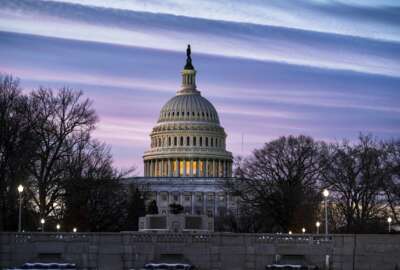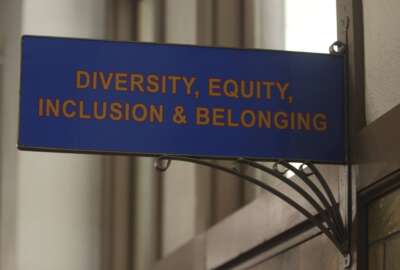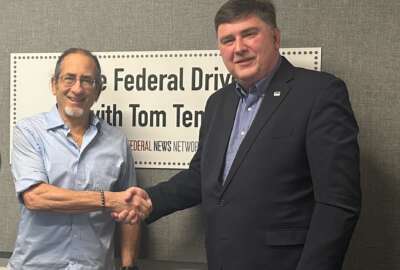Investigation by states shuts down GIBill.com
Under a settlement announced Wednesday by 20 states' attorneys general, the Department of Veterans Affairs will take control of a website that consumer fraud...
By Jared Serbu
and Taeja Smith
Federal News Radio
Within the next few days, the Department of Veterans Affairs will take ownership of a website that officials say has been used to defraud military members and veterans into misusing their G.I. Bill benefits.
The announcement, made Wednesday by several state attorneys general was the culmination of an investigation of and settlement with the operators of the website GIBill.com. The site is run by an online marketing company, QuinStreet, Inc., and the states claim its only purpose is to funnel veteran and servicemember benefits under the Post-9/11 GI Bill into private, for-profit educational institutions that pay to be listed on the site.
“This company preyed on our veterans who received educational benefits as a result of their military service to our country,” said Jack Conway, the Kentucky attorney general who led the investigation and negotiation with QuinStreet. “The actions were unconscionable and purposefully drove veterans to for-profit colleges who were perhaps more interested in getting their hands on the federal benefits than educating our soldiers and their families.”
Conway and other state AGs said the programs offered by the corporate schools, frequently through online courses, are much more expensive and far less valuable than degrees a servicemember could have obtained through a state university or community college.
Company to turn domain name over to VA
Under the terms of the settlement, QuinStreet will relinquish control of the GIBill.com domain name, often the first result for people looking for information about the GI Bill through a search engine, to the Department of Veterans Affairs.
The firm also will pay $2.5 million to settle the consumer protection claims the states brought and agrees to several safeguards intended to make clear that any other websites the company runs are not affiliated with the U.S. Government.
In a statement, QuinStreet called the domain name a “donation” to VA, and said that the company is a “leader in ethical online marketing practices.”
“QuinStreet does not engage in deceptive marketing practices and does not believe that its websites were misleading prior to the agreement. QuinStreet believes that entering into the Agreement provides greater clarity and certainty, and avoids a potentially longer, more costly and distracting process,” the company said.
As of today, the site prominently announces that it’s not affiliated with the federal government. But according to screenshots taken before the legal action, GIBill.com offered itself as a directory of what it called “GI Bill schools,” and schools that “accept the GI Bill.” All of them were for-profit colleges.
But Scott Gould, the VA’s deputy secretary said GI Bill benefits can be used just about anywhere.
“You can go to any kind of school you want,” he said. “We’ve paid over $20 billion in benefits over the past four years to over 750,000 individuals. It would be of particular concern to VA if we learned that our veterans were being hurt or misled in trying to gain the use of those benefits.”
Consumer advocates and attorneys general said recruitment of veterans intensified when Congress enacted the Post 9/11 GI Bill, which made billions of dollars in educational benefits newly available for veterans and their families. An investigation by the Senate Committee on Health, Education, Labor and Pensions found that military educational benefits paid out from the treasury rose from $66.6 million in 2006 to $521 million in 2010.
Colleges saw service members as ‘dollar signs in uniform’
Tom Harkin (D-Iowa), the committee’s chairman, said he concluded as a result of the review that because of the generous benefits of the post-9/11 GI bill, corporate colleges view servicemembers as “dollar signs in uniform.”
“That’s how the for-profit colleges were looking at our GIs. Not as individuals who had borne the brunt of battle or who needed to be helped with their education, but as dollar signs in uniform.”
Harkin and other lawmakers want to take other steps to protect veterans from being misled by deceptive websites and other marketers. VA has already applied to trademark the phrase “GI Bill,” but there are concerns that the application won’t stand up under existing trademark law. One congressional proposal would codify in federal law that the government has exclusive use of the phrase.
Sen. Dick Durbin (D-Ill.) was dismayed that Congress hasn’t done much on the issue of fraudulent recruiting by for-profit colleges, and that states had taken the lead on the issue.
“It’s reached a point now where you can little or nothing done when you take on the for-profit schools in Congress,” he said. “If you want to know why, ask any member of Congress. They own every lobbyist in this town.”
Senators and state AGs who gathered for a press conference on the issue declined to say that every for-profit school is acting in a predatory fashion. But they argued it’s a “race to the bottom,” and that for-profit schools that operate ethically can’t compete with those that don’t.
Conway said the for-profit educational industry is more a product of Wall Street than of academia.
“We’ve been preparing to announce this for about the past 36 hours, and I can’t tell you how many financial reporting companies and hedge funds have called our office trying to figure out what we’re doing, ” he said. “These are public companies taking tax dollars, and they are, in many instances, not doing what we need them to do.”
In a filing with the Securities and Exchange Commission, QuinStreet said GIBill.com never made a significant contribution to its revenue.
“The company believes that any negative effects we may experience could be mitigated by ongoing optimization efforts,” the filing said. “The company also believes that the changes are likely to be adopted more broadly in the industry, reducing or eliminating any relative disadvantage.”
Wall Street also brushed off the settlement. The company’s shares ended Thursday 0.54% higher on the NASDAQ exchange.
RELATED STORIES:
VA needs to tighten oversight of GI bill
DoD, VA, Education toughen rules against predatory colleges
How common are government trademarks?
Copyright © 2025 Federal News Network. All rights reserved. This website is not intended for users located within the European Economic Area.






